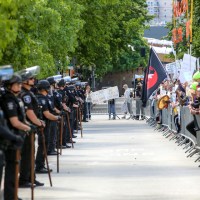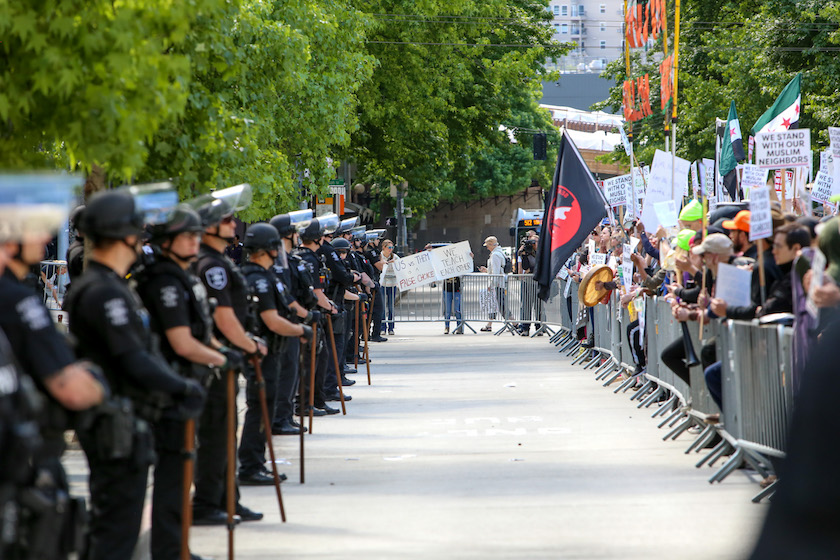It’s been a difficult few days. Between the shooting at a congressional baseball practice, the Philando Castille verdict, and the terror attack targeting Muslims in London, my heart feels heavy and tired.
When I’m overwhelmed by tragic news, I sometimes find myself getting mad and using tragedy to justify my anger toward a certain group of people.
And I’m not the only one who does this.
It’s discouraging to read through news reports about these events and see people using tragedy to demonize those who disagree with them. Progressives point to the London attack as proof that not all terrorists are Muslim and use it as ammunition to defeat anyone who holds a strong opinion about national security, the travel ban, or refugee policy. Meanwhile, some on the conservative side point to the congressional baseball shooting as proof that the rhetoric of the left has gone too far and is tearing our country apart.
In this way, we use tragedies that should bring us together in empathy and solidarity, to divide us even further.
It seems like nearly every response to every news report is now partisan. Even people’s lives and deaths have become partisan issues. We read a story and immediately sort ourselves into sides. Instead of grieving, we collect body counts, links to news stories from like-minded sources, and trial verdicts as ammunition to humiliate our political opposition on Facebook.
Honestly, it’s nauseating.
This type of response is itself a form of violence. When we use death and destruction and terror attacks for our own social or political gain, we are heaping violence on top of violence. Hate on top of hate.

And don’t we know that hate and violence and are counterproductive? The only way to diffuse hate is with love.
The only effective response to extremist violence—regardless of which “side” it comes from—is an extremism of another sort. It’s extreme love. Radical, stupid love that is uncomfortably selfless.
We saw examples of this love both in Washington, DC and in London.

In the moments after a man drove his van into a crowd of worshippers coming out of a London mosque after evening prayers, killing one and injuring nine others, people were understandably enraged. Some in the crowd dragged the driver out of the van and hit him while he reportedly shouted, “I did my bit. You deserved it!”
But then Mohammed Mahmoud, the imam of the mosque, came running out and stopped his friends from hurting the man who had just tried to murder them.
“Don’t touch him!” Mahmoud shouted. He turned to the man, pinned him to the ground and with the help of several others, held him there until authorities arrived to arrest him.
He didn’t have to do that. The man probably deserved whatever beating he was about to receive. But the imam understood that more violence, even if it was justifiable in the eyes of some, would not undo the violence that had already been committed. In that moment, only unjustifiable love could prevent more death.

In Washington, DC, when a shooter opened fire on Republican lawmakers while they practiced for a charity baseball game, Rep. Steve Scalise’s security detail responded quickly, killing the shooter and protecting everyone present. One of the agents who risked their lives was Capitol Police officer Crystal Griner. Despite being shot in the ankle, she continued to fire back at the shooter until she finally took him down. She saved the lives of several Republican congressmen, despite the fact that some of them have vigorously opposed many policies that are likely important to her as a gay, black woman. We don’t know everything about Crystal Griner’s politics, but we do know that in that moment she chose love and professionalism over violent partisanship.
These are exceptional examples of extreme love in the face of extreme hatred, and hopefully most of us will never be in these kinds of situations. But that doesn’t let us off the hook.
If anything, we’re called to do even more—because the only thing more radical than love in the face of hate is preemptive love. It’s loving someone else before you know whether or not you should. Before you know which “side” they’re on. And then still loving them after you’ve figured it out, because you refuse to let “sides” dictate how you treat someone.
If there had been more preemptive love, perhaps the extremists who carried out these reprehensible attacks wouldn’t have found themselves out on the fringes. Maybe, if more people refused to make every issue a partisan line in the sand, and instead showed some empathy across party lines, across sectarian lines, across racial lines—maybe the fringes would become less and less populated until the sides didn’t feel so jarring. Or maybe they’d stop being “sides” and morph into differences of opinions, cushioned with love and empathy.
Do you know who makes up these “sides”? It’s not the politicians. They’re just the ringleaders (or circus leaders… depending on the day). It’s us. Which means we can refuse to join their crazy and insist on seeing each other’s humanity—which will allow us to grieve violence wherever we see it, without making it partisan.
By doing these small things, we can not only “love across enemy lines,” we can dismantle the battle lines. We can wage peace on the frontlines, instead of waging war.
The people in the ICU in London after being run over by a terrorist are in our prayers. The family of Philando Castille are in our prayers. Rep. Scalise, officer Grines, and all who were injured in the shooting in DC are in our prayers.
We stand with all victims of violence. And we stand with you as you go out and wage peace with your preemptive love.


